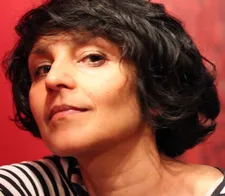 |
| Venus. Eisha Marjara: 'In Venus the focus was not on the transition but on Sid's relationships and her discovering herself as a woman and a new parent and a daughter and a colleague' Photo: Wolfe |
Venus, out now in the US on VoD and DVD, is a delightful exploration of the challenges faced by trans woman Sid (Debargo Sanyal), who discovers, on the point of coming out, that she has a son (Jamie Mayers) she knew nothing about. Or as I put it at the time: “gentle; lyrical; funny”.
So I was looking forward to speaking with its Quebec-based writer and director Eisha Marjara.
I began by asking how she arrived at a film like Venus, given that she had started in documentary – and then proceeded to this very different, lighter genre. Eisha did not see it that way.
 |
| Eisha Marjara: 'As a writer and artist my job is to help the reader/audience to understand the world being created' Photo: Mélanie Robert |
“I don't consider my self as a documentary filmmaker”, she says. “The documentary I did write and direct [Desperately Seeking Helen] was very unconventional and very much on the edge of what a documentary should be. It was a hybrid format, with a lot of blurring the lines between fiction and reality.
“I was challenging the genre, and this was a point of view film, trying to get to a certain truth”.
That made sense. One aspect of Venus I enjoyed greatly was its simple observational quality, the camera running over the main players as much as editorialising on their behalf. And this – Eisha's approach, focused on the deeper – truth struck a chord. But, I wondered, in an era of “fake news” might that merging of fact and fiction be an issue?
Eisha was alive to this: “Cinema is manipulative and will fail as a way to represent reality.
“We live in a time of fake media where real/false is a very inflammatory subject and a lot of information is funnelled through some very narrow sound bites. It is very hard to look at things with any depth. But as a writer and artist my job is to help the reader/audience to understand the world being created. There is room for fantasy and allegory”.
However, she underlines that the key to her approach is making sure the audience understands that she is playing with fact and fiction. She must set up the base parameters early in the script writing so that they know what she is doing. And this works because, she asserts: “For the most part people are smart and bold and open-minded and have seen a lot of films of this sort enabling them to understand that”.
 |
| Eisha Marjara: 'Gender is a topic I have been tapped into since the age of 12' Photo: Wolfe |
Therefore, “it seems so normal and so natural for me to write and to explore a story about someone who is trans”. Although, as she is keen to emphasise: “In Venus the focus was not on the transition but on Sid's relationships and her discovering herself as a woman and a new parent and a daughter and a colleague."
As such, Venus was less a film “about” transgender, as about “passing a camera across a series of relationships”. Yes, it is primarily the story of Sid but it is also about Sid's relationships with her son, who is the catalyst who sets the story in motion, and her mother and her ex-partners, as well as the interactions between all of those.
But what did Eisha intend the focus to be? Her answer is fascinating and in line with her earlier remarks about observation. When she works on a film over years, she is involved in so many drafts she develops a certain numbness to it and in the end she returns to understanding her work through the responses of those who go to view it.
Although when pushed, she owns that she sees Daniel, Sid's rekindled love interest, as weak rather than fundamentally bad.
 |
| Eisha Marjara: 'It seems so normal and so natural for me to write and to explore a story about someone who is trans' Photo: Wolfe |
In the wider context, Eisha admits she is aware of the wish, widely expressed within the trans community, for such roles to go to trans actors. She is in agreement. But, she explains, Sid is not just transgender: it is important to be “critical and discerning of who the character is”. She spent a year and a half searching for an actor she felt fitted the role and in the end settled on Sanyal, who has a track record in trans roles.
She is happy with this. The response from the trans community has been enthusiastic: it has picked up awards from the German trans film festival and has had a mostly trans audience. In addition, there are trans actors in the film, many of the background actors are trans and two trans scriptwriters were consulted on the script.
As for the future, Eisha is working on a feature film called Calorie. This is a mother-daughter story (exploring such relationships is a particular interest of Eisha) about an Indo-Canadian mum with two hard to handle teenage daughters: one anorexic, one a wild party girl. So she ships them off to India for the summer while she tries to get her life together.
Meanwhile, and hanging over the present is a difficult past for this character, A problem relationship with her own mum - and there fore history repeating itself – complicated by the fact that her mother died in the Flight 182 Air India bombing.
In addition to the DVD/VoD release Venus is also being developed into a TV series, which will enable those who have enjoyed the film to “explore the smaller stories and the supporting stories and go deeper”.
Given the audience Venus has already won for itself, it is likely that that will be a popular move.
Venus is out now via Wolfe on DVD & VOD and across all digital platforms including iTunes, Vimeo On Demand and WolfeOnDemand.com, and many major retailers.





















